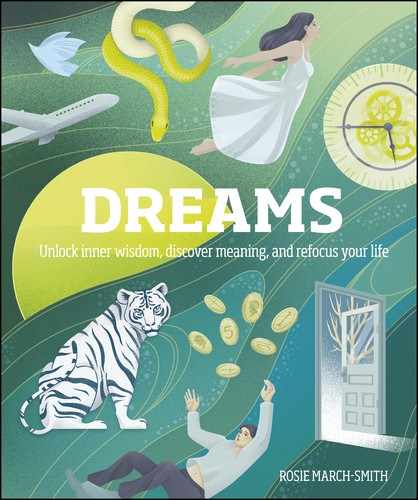
20
The Theory of Dreams
THE DREAM
PIONEERS
The ancients knew about dreams—
though we glean most through biblical
accounts—but it was not until the
early 20th century that modern dream
interpretation gained a wider
understanding. Instead of burning
bushes and ery chariots (which now
sound more like UFO sightings than a
prophet’s warning), dream content
held fascinating, intimate details to
professional observers. Their
signicance was seen as profoundly
meaningful, revealing at last the inner
workings of the dreamer’s mind.
US_020-021_The_pioneers_01.indd 20 04/06/2019 11:14

21
The Dream Pioneers
Sigmund Freud
Austrian psychiatrist Sigmund Freud, the
acknowledged founder of psychoanalysis,
ranks as the foremost leader of talk therapy.
Freud was the rst to recognize the signicance
of dreams in mental health. He published his
book, The Interpretation of Dreams, in 1900,
setting the stage for psychoanalytic theory and
electrifying his colleagues with its daring
content: Freud believed his patients’ sleep
narratives largely held covert sexual conict.
However, several researchers have
wondered since if his own personal struggle
with his sexual leanings was not sometimes
coloring his interpretations. He insisted that to
be accepted by his skeptical peers, it was
essential to keep to a strict, rational position.
He failed to accept any mystical, otherworldly
interpretations suggested by one or two of
his students.
Signicantly, Freud saw the connection
between the tragic Greek character Oedipus—
accidentally killing his father and marrying
his widowed mother, believing he had been
adopted at birth—and the hidden, repressed
sexual longings in his patients.
Though he is known mostly today for his
theory of repression, Freud developed other
important ideas still widely respected over a
century later by mental health practitioners.
“
FREUD BELIEVED HIS PATIENTS’
SLEEP NARRATIVES LARGELY HELD
COVERT SEXUAL CONFLICT.
”
Continued
US_020-021_The_pioneers_01.indd 21 04/06/2019 11:14

22
The Theory of Dreams
“
JUNG SAW A DREAM AS THE
EXPRESSION OF THE WISDOM
OF THE UNCONSCIOUS.
”
Carl Jung
An analytical psychologist and Freud’s student
for some years, Swiss-born Carl Jung’s name is
synonymous with dream interpretation. Jung
has inuenced modern dream studies more
than anyone. Opposed to his mentor’s
professed one-track view of dream analysis,
Jung broke away, insisting that dreams come
from a transcendental source—the world of the
spirit. He declared they reect our waking
selves and help solve problems, a far more
positive take that contributed to his philosophy
that the human psyche has greater inuence
than personal experience alone.
This led Jung to develop his own ideas about
the value of dreams, far removed from hints at
the forbidden in disguised form. He saw a dream
as the expression of the wisdom of the
unconscious. He believed it was often cloaked in
symbolism or metaphor, powerfully integrating
the conscious with the unconscious—and he
valued that concept highly.
Jung saw dreams as useful indicators to
determine the dreamer’s journey toward
individuation: transforming an unformed person
into a unique individual. He maintained that
women have a masculine (animus) side to their
psyche while men have a feminine (anima) side,
both of which are essential for that journey.
Unlike Freud, he embraced the holistic way
of life. Jung believed in alchemy, astrology, and
mythology. He had the courage to embark on
self-analysis to the point of confronting his own
unconscious world, considered a dangerous
exercise. But as a result of enduring a mental
breakdown, he emerged with clear ideas about
archetypes, complexes, the collective
unconscious, and individuation, all of which still
inuence psychiatric and psychological
teaching today.
Calvin S. Hall
A younger contemporary of Jung, American-
born Calvin Springer Hall approached the world
of dreams from a dierent perspective. A
behavioral psychologist, he developed a
cognitive theory of dreams in the middle of the
last century, rejecting Jung’s belief that dream
content sometimes comes from higher levels
US_022-023_The_pioneers_02.indd 22 04/06/2019 11:14

23
The Dream Pioneers
outside the self. He contended they were only
the result of the dreamer’s personal thoughts,
hopes, fears, and experiences.
Hall declared that dreams convey the
dreamer’s conceptions of self, family, friends,
and so on—and that they revealed qualities
(for example, “weak,” “domineering,” or “loving”)
that essentially mirror the dreamer’s own views.
Edgar Cayce
American-born Edgar Cayce, the son of a poor
Kentucky farmer, became famous in the early
part of the 20th century because of his ability to
dream clairvoyantly, diagnosing thousands of
grateful patients and—from the sleep state—
recommending healing remedies.
The dream world was central to his being.
Cayce unwittingly illustrated Jung’s idea of
group consciousness, demonstrating how he
was able to “see” from afar and diagnose
unfamiliar people without any prior knowledge
of their condition. But unlike Jung, he claimed
to be able to examine trauma in previous
lifetimes—as in reincarnation—which frequently
explained their present troubles.
Cayce’s story began as a boy. He was upset
by his father’s anger at his diculty with
learning spelling. Once, he laid down with his
head on a spelling book and fell fast asleep.
Strangely, when he woke up, he knew all the
correct answers. Later, he learned in the sleep
state how to cure his chronic loss of voice and
to heal a long-term boyhood ailment.
Cayce was aectionately known as “The
Sleeping Prophet.” Thousands of patients over
the years asked for his help and valued his
“prescriptions”—holistic treatments such as
homeopathy, essential oils, mud baths, special
diets, and meditation. He used to say “Dreams
are tonight’s answers to tomorrow’s questions,”
and, like Jung, used symbols to convey
meaning to dreams.
US_022-023_The_pioneers_02.indd 23 04/06/2019 11:14
..................Content has been hidden....................
You can't read the all page of ebook, please click here login for view all page.
